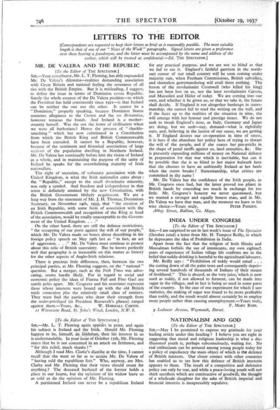LETTERS TO THE EDITOR
[Correspondents are requested to keep their letters as brief as is reasonably possible.. The. most suitable, length is that of one of our " News of the Week" paragraphs. Signed letters are given a preference - over those bearing a pseudonym, and the latter must be accompanied by the name and address of the author, which will be treated as confidential.—Ed. THE SPECTATOR.] MR. DE VALERA AND THE REPUBLIC [To the Editor of THE SPECTATOR.] Stu,—Your contributor, Mr. L. T. Fleming, has ably expounded Mr. De Valera's dilemma—realities demanding association with Great Britain and national feeling the severance of all ties with the British Empire. But it is misleading, I suggest, to define the issue in terms of Dominion versus Republic. Surely the whole essence of the De Valera position—to which the President has held consistently since 1921—is that Ireland can be neither the one nor the other. It cannot be a " Dominion," properly speaking, because Dominion Status connotes allegiance to the Crown and the res Britannica, however tenuous the bands. And Ireland is a mother- country herself. Was she not the home of civilisation when we were all barbarians? Hence the process of "shackle- smashing " which has now culminated in a Constitution from which the British King and British Commonwealth have been extruded. It cannot be a Republic, however, because of the sentiment and historical associations of large sections of the population dwelling in Northern Ireland. Mr. De Valera has continually before hini the vision of Ireland as a whole, and in maintaining the purpose of the unity of Ireland he speaks fof the overwhelming majority of Irish nationalists.
The right of secession, of voluntary association with the United Kingdom, is what the Irish nationalist cares about : the " Republic," except to the small doctrinaire minority, was only a symbol. And freedom and independence in that sense is definitely attained by the new Constitution, with the British Government blithely acquiescent. We are a long way from the statement of Mr. J. H. Thomas, Dominions Secretary, on November 14th, 1933, that " the creation of an Irish Republic, with some form of association with the British Commonwealth and recognition of the King as head of the association, would be totally unacceptable to the Govern- ment of the United Kingdom. . . ."
On the other hand, there are still the defence restrictions, " the occupying of our ports against the will of our people," which Mr. De Valera made no bones about describing .in his foreign policy speech on May Igth last as " in fact, an act of aggression.. . ." Mr. De Valera must continue to protest about this relic of British suzerainty. But he knows perfectly well that geography is as inexorable on this matter as history for the other aspects of Anglo-Irish relations.
There is precious little difference, then, between the two principal parties, as Mr. Fleming suggests, on the " national " question. But a merger, such as the Irish Times was advo- cating, seems hardly likely. For in regard to social and economic policy the ideas of Fianna Fail and Fine Gael are surely poles apart. Mr. Cosgrave and his associates represent those whose interests were bound up with the old British trade connexion plus the relatively sniall class of refiners. They must find the parties who draw their strength from the wider privileged (in President Roosevelt's phrase) ranged


























































 Previous page
Previous page